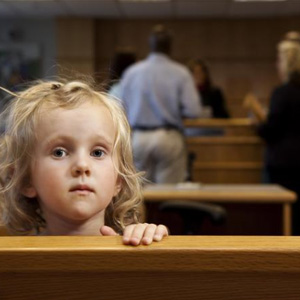
As a divorced parent, you may find yourself dating and eventually considering marrying another divorced parent. Since the middle of the twentieth century, married couples where at least one partner has a child from a previous relationship have become increasingly common in the United States. However, just because this type of setup is fairly common does not mean it is without its challenges. Adjusting to life after a divorce can be difficult for all members of a family. For the adults involved, a divorce means potentially losing one’s home, a significant portion of his or her net worth, and daily interaction with his or her child. For a child, a divorce can mean a completely new lifestyle and no control over the changes that accompany this new lifestyle. As a parent, it is your job to make your divorce as…Read More

Legally, a child becomes an adult on his or her eighteenth birthday. This is the date at which he or she does not need parental permission for decisions such as marrying, elective surgery, tattoos and other body modifications, and working. For most individuals, this transition from childhood to adulthood is known as “emancipation.” When a child is emancipated, his or her parents lose the right to make decisions on his or her behalf. They also lose their financial responsibility toward him or her. An adolescent may seek emancipation through the court if he or she feels he or she must become a legal adult before the age of eighteen. This often occurs when he or she is tasked with caring for younger siblings, needs to leave an abusive household, or is engaged in a lucrative career and needs to have…Read More

The relationship between a child and his or her grandparent is an important one. Grandparents provide support and care for children alongside their parents, developing unique inter-generational bonds. When a child’s parents divorce, the grandparents are often understandably worried about what will become of their relationships with their grandchildren. If you are a grandparent, your right to visit and spend time with your grandchild is not guaranteed by law. In most cases, a child’s parents encourage their child’s relationship with his or her grandparents and foster visits and outings together. However, a parent may contest a grandparent’s right to spend time with his or her child on the basis of abuse, neglect, or toxic dynamics that would negatively impact the child. When this happens, the grandparent has the option to file a motion to the court to require that he…Read More

A child can not have three legal parents. For a step parent to become a child’s legal parent, the child’s non-custodial parent must relinquish his or her parental rights. This can occur voluntarily or involuntarily. If the natural parent voluntarily gives up his or her parental rights, he or she loses any right to seek custody or visitation with the child. The custodial parent also loses the right to seek child support from him or her once those rights are relinquished. If a parent refuses to give up his or her parental rights or he or she can not be located, the court may terminate his or her parental rights so the child may be adopted. If the natural parent is found guilty of any of the following, he or she may lose his or her parental rights involuntarily: A…Read More

Even without having to work around a child custody schedule, the holidays can be hectic. When you have your child’s custody arrangement to consider, they only become more stressful. In most shared custody arrangements, the children spend part of the week with one parent and the rest of the week with the other. Sticking to this rigid schedule can create situations where the children miss out on one extended family’s holiday celebration each year or one parent spends every holiday with the children. There are a few solutions to this dilemma. For most families, the standard holiday parenting schedule put forth by New Jersey’s family courts is the best solution. In this schedule, a child’s parents alternate spending each holiday with the child every year. But this is not the only option for your holiday parenting schedule. Depending on your child’s age,…Read More

The short answer is yes, New Jersey’s family court system may prevent you from moving out of state if you are currently sharing custody of your child with your former partner. This is because moving out of state can make it impossible for your child to maintain a relationship with both of his or her parents, which can have a negative impact on him or her as well as the non-custodial parent. However, sometimes life takes you out of New Jersey. Maybe you’ve been offered a job opportunity that could propel your career forward or a family member needs you to provide in-home care. As a custodial parent, your child’s other parent must consent to your move for you to relocate to a new state. If he or she does not grant consent, you will need to seek a court…Read More

One of your options to control the outcomes in New Jersey divorce and child custody matters is use of mediation procedures. Mediation allows both parties, both parents to state their preferences and to come to an agreement outside a courtroom. Some typical issues that can be resolved through mediation include: 1) living arrangements for the children, 2) childcare choices and expenses, 3) non-custodial parent and grandparent visitation, 4) education choices and expenses, and 5) medical choices and expenses. Since these issues tend to involve both emotional and financial aspects, having an experienced family lawyer representing you in your mediation process can bring better results for you and your children in the long run. New Jersey state laws and prior court decisions influence mediations as well as court proceedings, establishing the rights of both spouses in a divorce matter, and also…Read More

Getting off to the right start to gain understanding of the Child Support Guidelines in New Jersey means knowing exactly who you are, and understanding your legal position in a child support matter as defined in the Guidelines. While you may not know for sure who will be paying child support, or how much child support a court will order, your best choice may be speaking to a family law expert, a lawyer who knows how it usually works for all parties involved in child support matters. The Guidelines are long and complex, and they are also interpreted by precedent, or previous court decisions that may impact your own case in one way or another. Even if you chose to read the New Jersey Child Support Guidelines and draw some conclusions regarding your own situation, it’s very likely you’ll miss…Read More

Child custody is often one of the most complicated issues in the divorce process. The divorce process is quite lengthy and daunting for the parents, but it can also have a detrimental impact on the children. If the parents cannot reach a mutual agreement amongst themselves in relation to child custody, the issue is then handled by the Family Division of the Superior Court of New Jersey in whatever county they reside in. Child custody is composed of Legal Custody and Physical/Residential Custody. Legal custody is when the parent/s has the responsibility of making decisions concerning the child’s health, education and welfare. Typically, parents share what is known as Joint Legal Custody. Physical/Residential Custody deals with where the child resides. There is a lengthy list of factors under N.J.S.A. 9:2-4c that the Courts must abide by and consider when handling…Read More
